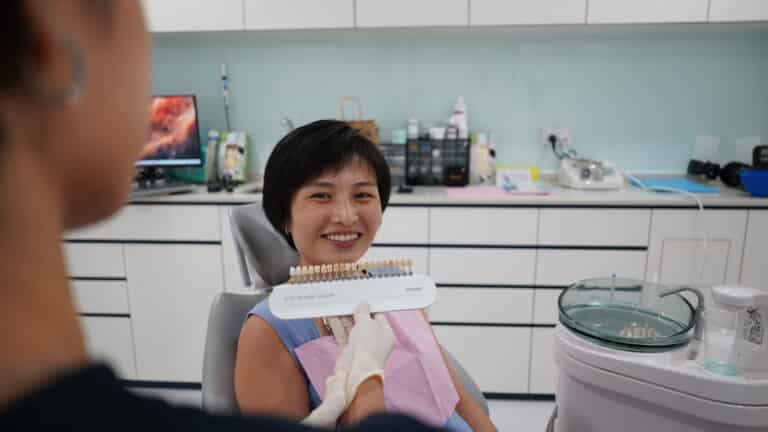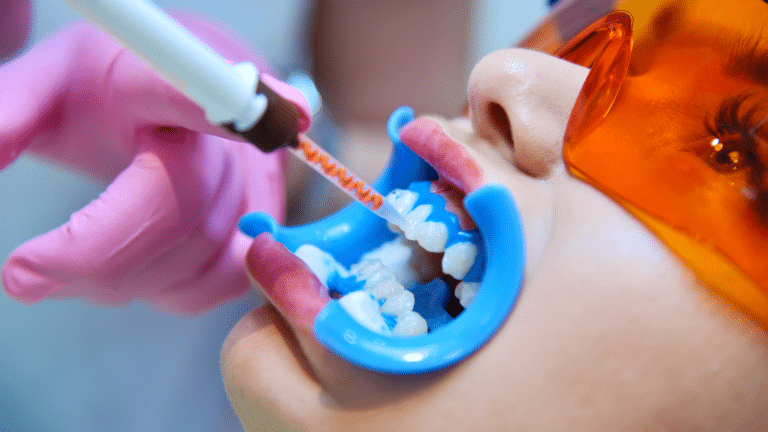A Complete Guide to Wisdom Teeth in Singapore
If you’ve ever wondered about wisdom teeth and whether they need to be removed, you’re not alone. These teeth—known as third molars—often spark questions, concerns, and sometimes discomfort. While some people never notice them, others experience swelling, pain, or even neck stiffness as they emerge.
In this guide, I’ll walk you through everything you need to know: from whether everyone gets wisdom teeth to how to manage pain, when removal is advised, and what costs to expect in Singapore. Whether you’re simply curious or dealing with discomfort, this article is here to help you make an informed choice about your oral health.
What Are Wisdom Teeth?
Wisdom teeth, also known as third molars, are the final set of molars that sit right at the very back of your mouth. Unlike the first and second molars, which erupt in childhood, wisdom teeth usually appear much later—often in the late teens or early twenties, a stage in life once associated with gaining “wisdom.”
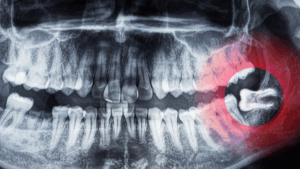
Why Wisdom Teeth are different?
Because they emerge last, wisdom teeth often face limited space to grow properly. This can lead to issues such as impaction, crowding, or partial eruption**, which explains why they are one of the most frequently discussed teeth in dentistry.
How Many Wisdom Teeth Do Humans Have?
Most adults develop up to four wisdom teeth—two in the upper jaw and two in the lower jaw. But the actual number varies significantly from person to person.
- Some individuals develop only one or two.
- Others may never develop any at all, and this is perfectly normal.
- In rare cases, extra wisdom teeth may form—these are called supernumerary molars.
The differences usually come down to genetics and jaw development. For example, people with smaller jaws may not have enough space for wisdom teeth to erupt fully, while others may naturally never develop them at all.
Will Everyone Get Wisdom Teeth?
Wisdom teeth are believed to be a vestigial feature from our ancestors who had larger jaws and needed extra molars to grind down plant tissues. As human diets and jaw sizes evolved, wisdom teeth have become less necessary and often cause issues due to limited space in modern jaws. The truth is not everyone develops wisdom teeth. Some people have all four, others only one or two, and some never get them at all. This is entirely normal.
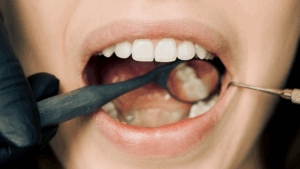
What Determines Wisdom Teeth Growth?
Not everyone develops wisdom teeth, and the reasons often come down to a combination of biology and evolution. Several factors play a role in whether you’ll have them—and how many will eventually emerge.
- Genetics – Family history strongly influences wisdom teeth development. If your parents or grandparents never grew them, there’s a higher chance you won’t either.
- Jaw Size – Modern jaws are generally smaller than those of our ancestors. Limited space can prevent wisdom teeth from erupting properly, leaving them impacted or absent altogether.
- Evolutionary Changes – As diets became softer and easier to chew, the need for extra molars reduced. Over time, fewer people worldwide are developing wisdom teeth at all.
If you never notice wisdom teeth coming in, it usually isn’t a cause for concern. In fact, many people live perfectly healthy lives without them.
When Do Wisdom Teeth Grow?
Wisdom teeth usually begin to emerge between the ages of 17 and 25, a stage often referred to as early adulthood. However, their timing varies greatly from person to person.
- Earlier growth – Some people notice their wisdom teeth starting to push through during their mid-teens.
- Later growth – Others may not see their wisdom teeth erupt until their late twenties, or in some cases, not at all.
- Non-eruption – For many, wisdom teeth remain hidden beneath the gums or never develop at all.
The presence of wisdom teeth can be confirmed through dental X-rays. These images allow our experienced dentists at WeSmile Dental Care to see if wisdom teeth are developing and determine their position in your mouth.
How do I know if I have Wisdom Teeth?
Symptoms such as pain, swelling, or discomfort at the back of your mouth may also indicate that your wisdom teeth are coming in or are impacted.
In addition to routine dental check-ups, we offer a specialised service called Wisdom Insight Essentials. This dedicated service focuses on providing a thorough analysis of your wisdom teeth. The Wisdom Insight Essentials service includes:
- Full-Mouth X-Rays: We utilise advanced imaging technology to get a complete view of your dental structure, allowing us to assess the position and development of your wisdom teeth accurately.
- In-Depth Wisdom Tooth Analysis: Our experienced dentists will evaluate your wisdom teeth, considering factors such as alignment, potential for impaction, and any related concerns.
This comprehensive service ensures that you receive detailed insights and personalised recommendations for your wisdom teeth, helping you make informed decisions about your dental health. If you have concerns about your wisdom teeth or just want to understand their status better, consider scheduling a Wisdom Insight Essentials consultation at WeSmile Dental Care.
First Signs of Wisdom Teeth Coming In
Wisdom teeth don’t always announce their arrival. For some, they erupt quietly with little to no discomfort. For others, the process can bring noticeable changes—most often during the late teenage years or early twenties, when these teeth are most likely to emerge.

Common early signs to look out for include:
- Gum swelling or redness at the very back of the mouth.
- A dull ache or intermittent throbbing that comes and goes.
- Tenderness or sensitivity when chewing or biting down.
- Difficulty keeping back teeth clean, leading to food getting trapped easily.
- Discomfort radiating to the jaw, ear, or even neck, especially if the tooth is impacted.
It’s important to note that not everyone will experience these symptoms. Still, if you notice any of these signs, it’s a good idea to schedule a dental check-up for a proper assessment.
How to Endure Wisdom Tooth Pain?
Wisdom tooth pain can range from a dull ache to sharp discomfort, and while it’s best to have the cause assessed by a dentist, there are ways to manage the pain in the meantime. These home measures won’t fix the problem, but they can make daily life a little more comfortable until you get professional care.
Simple ways to ease wisdom tooth pain temporarily:
- Apply a cold compress – Holding an ice pack or cold towel to the outside of your jaw can help reduce swelling and numb the area.
- Rinse with warm salt water – This helps soothe inflamed gums and can reduce bacteria around the tooth.
- Choose soft foods – Stick to soups, mashed foods, or yoghurt to avoid extra pressure on sore areas.
- Use over-the-counter pain relief – Medication such as paracetamol or ibuprofen may provide short-term relief. Always follow the instructions on the packaging and consult a pharmacist or doctor if unsure.
These remedies are only temporary solutions. If pain continues, worsens, or is accompanied by swelling, difficulty opening your mouth, or fever, it’s important to see a dentist promptly for proper evaluation and treatment.
Challenges associated with Wisdom Teeth
While some people develop them without issue, many face complications due to the lack of space in the jaw, awkward eruption angles, or partial emergence. These challenges can affect not only oral health but also overall comfort, alignment, and long-term dental stability.
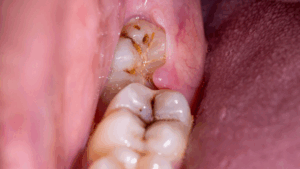
Wisdom Teeth Causes Impaction:
Wisdom teeth often don’t have enough space to emerge properly, leading to impaction. This means the teeth can become trapped beneath the gum line or grow at an angle, causing pain and potentially damaging adjacent teeth.
Wisdom Teeth Causes Crowding:
As wisdom teeth attempt to come through, they can push against existing teeth, causing crowding and misalignment. This can undo years of orthodontic work or lead to crooked teeth.
Wisdom Teeth Causes Infection and Swelling:
Partially erupted wisdom teeth can create pockets where bacteria accumulate, leading to infections and gum inflammation. This condition, known as pericoronitis, can cause significant discomfort and swelling.
Wisdom Teeth Causes Cysts and Tumors:
Impacted wisdom teeth can lead to the formation of cysts or tumors in the jawbone. These growths can damage surrounding bone and teeth, potentially requiring more extensive surgical procedures.
Wisdom Teeth Causes Teeth Decay and Gum Disease:
Wisdom teeth are located at the back of the mouth, making them harder to clean thoroughly. This difficulty can increase the risk of cavities and gum disease, which can affect overall oral health.
Wisdom Teeth Causes Pain and Discomfort:
As wisdom teeth come in or become impacted, they can cause significant pain and discomfort. This pain can affect daily activities, including eating and speaking, and may necessitate professional intervention.
Understanding these challenges underscores the importance of monitoring your wisdom teeth and seeking advice from a qualified dentist. At WeSmile Dental Care, we can help you navigate these issues with expert care and tailored treatment options to ensure your dental health remains optimal.
Is it good to keep Wisdom Teeth?
Whether to keep wisdom teeth depends on their position and the potential for causing problems. If wisdom teeth grow in correctly and do not cause any discomfort or alignment issues, they may be left in place. However, if they are impacted, misaligned, or contribute to oral health problems, extraction may be recommended to prevent complications.
What are the Benefits of Wisdom Tooth Extraction?
Wisdom tooth extraction offers several key benefits for maintaining healthy teeth and gums. By removing impacted or problematic wisdom teeth, you can:
✅ Relieve pain and discomfort – Extraction eases pressure, soreness, and jaw aches often linked to wisdom teeth trying to emerge.
✅ Reduce the risk of infection – Prevents bacteria from accumulating around partially erupted teeth, lowering the chance of gum inflammation or pericoronitis.
✅ Prevent crowding and misalignment – Protects your other teeth from being pushed out of place, helping to preserve orthodontic results.
✅ Avoid damage to neighbouring teeth – Stops wisdom teeth from pressing against adjacent molars, which could cause cracks, cavities, or enamel wear.
✅ Lower the risk of cysts and tumours – Reduces the likelihood of abnormal growths forming in the jawbone that could damage bone and soft tissue.
✅ Support better oral hygiene – Makes brushing and flossing easier, helping reduce long-term risks of decay and gum disease.
Wisdom Tooth Extraction Cost in Singapore
Wisdom tooth removal is a common procedure, but the cost can vary significantly depending on whether the extraction is straightforward or requires surgery. Understanding the difference helps you plan ahead and avoid surprises.
- Simple Wisdom Tooth extraction – Typically less costly, this is done when the wisdom tooth has fully erupted and can be removed without surgery.
- Surgical Wisdom Tooth extraction – Generally more expensive, this involves a minor surgical procedure, often necessary for impacted or partially erupted wisdom teeth.
How Much Is Wisdom Teeth Removal?
In Singapore, the cost of wisdom tooth removal usually ranges from a few hundred dollars to over S$1,000 per tooth. The exact fee depends on factors such as the tooth’s position, the complexity of the procedure, and the clinic you visit.
Wisdom Teeth Extraction Pricing at WeSmile Dental
At WeSmile Dental, the indicative fees are as follows (inclusive of GST):
- Simple wisdom tooth extraction: S$212.55
- Surgical wisdom tooth extraction (for impacted teeth): S$1,547.80 (Medisave-claimable)
These represent the baseline “from” fees; the actual cost may vary based on how complex your case is — for example, how deeply the tooth is impacted, whether bone removal is needed, and its proximity to nerves.
Medisave & CHAS Coverage for Wisdom Teeth
Singapore residents may be able to reduce out-of-pocket expenses through government support schemes:
- Medisave – Can typically be used for surgical wisdom tooth extractions, helping offset a significant portion of the cost.
- CHAS (Community Health Assist Scheme) – Subsidies may be available for eligible patients, depending on the clinic and type of procedure.
Your dentist will be able to provide a personalised cost estimate after assessing your wisdom teeth, and advise you on which coverage options apply to your situation.
👉 Ready to learn more? Book your Wisdom Tooth Insight Essentials session at WeSmile Dental today and get clarity on your options, costs, and treatment journey.
Where to get Wisdom Tooth Extraction in Singapore?
In Singapore, you generally have two main options for wisdom tooth extraction: polyclinics/public hospitals or private clinics.
Wisdom tooth extraction at Polyclinics / Public hospitals
These institutions offer wisdom tooth extraction services and are typically more affordable. They provide comprehensive care, but the waiting times can be longer, and the level of personalised service may vary. Public hospitals are a good option for those looking for a cost-effective solution.
Wisdom tooth extraction at private clinics
Private clinics offer more flexibility in scheduling and often provide a higher level of personalised care. Among private clinics, it is crucial to choose a well-reputed and experienced clinic, especially if surgery is involved. Experienced dentists in reputable clinics ensure that the extraction is performed safely and effectively, minimising potential complications and enhancing recovery.
At WeSmile Dental Care, we pride ourselves on our expertise and commitment to patient care. Our experienced team ensures that wisdom tooth extractions are performed safely and effectively, with a focus on your comfort and well-being. If you’re considering wisdom tooth extraction, we encourage you to consult with us to benefit from our experienced professionals and comprehensive approach.
Additional FAQs About Wisdom Teeth
1. What Are the Risks of Wisdom Tooth Extraction?
As with any surgical procedure, wisdom tooth extraction carries some risks. These may include infection, bleeding, swelling, or delayed healing. In rare cases, patients may develop a condition called “dry socket,” where the blood clot protecting the extraction site becomes dislodged, causing pain. With proper care and by following your dentist’s instructions closely, these risks can usually be minimised.
2. How Long Is Recovery After Extraction?
Recovery differs for each person, but most patients are able to return to normal daily activities within two to three days. Full healing of the gums and bone may take a couple of weeks to a few months, depending on the complexity of the extraction. Sticking to the aftercare guidelines provided by your dentist is key to a smooth recovery.
3. How Can I Manage Pain After Extraction?
Mild to moderate discomfort is common in the first few days after removal. Pain is usually well managed with:
- Prescribed or over-the-counter pain relief medication.
- Cold compresses to help reduce swelling.
- Eating soft foods and avoiding hot, spicy, or crunchy items.
- Keeping the extraction area clean as advised by your dentist.
If pain worsens or persists beyond a week, it’s important to contact your dentist for review.
4. Can Wisdom Teeth Grow Back After Removal?
No. Once wisdom teeth are removed, they do not grow back. However, in very rare cases, small fragments of tooth root may remain and cause minor issues later if not detected during the procedure. This is uncommon, and your dentist will monitor for it during follow-up visits.
5. Can All Four Wisdom Teeth Be Removed at Once?
Yes. Many patients choose to have all four wisdom teeth removed during a single procedure for convenience. This approach reduces the need for multiple recovery periods. However, your dentist will first evaluate whether this is suitable for you based on your overall health, the position of the teeth, and the complexity of the surgery.
6. Do Wisdom Teeth Always Need Removal?
Not necessarily. Wisdom teeth that erupt fully, align correctly, and do not cause discomfort or crowding may be left in place. The key is regular monitoring with dental check-ups and X-rays to ensure they remain healthy and do not cause problems later on.
7. Can Wisdom Teeth Affect Sinuses?
Yes. The roots of upper wisdom teeth sit close to the sinus cavity. In some cases, impacted or infected upper wisdom teeth can contribute to sinus pressure, pain, or congestion. This is uncommon but possible, and your dentist will check for it if you experience sinus discomfort.
8. Can Wisdom Teeth Cause Headaches?
Impacted or misaligned wisdom teeth can place pressure on surrounding teeth and jaw joints, which may in turn trigger headaches or jaw pain. Infections around the wisdom teeth may also cause referred pain to the head and temples. If you experience frequent headaches along with dental discomfort, it’s worth discussing with your dentist.
9. Can Wisdom Teeth Cause Neck Pain?
Yes, in some cases they can. When wisdom teeth are impacted or infected, inflammation may spread to surrounding muscles. Because the jaw and neck are closely linked, this can lead to stiffness or aching in the neck.
If you notice persistent neck pain alongside gum discomfort, it could be related to your wisdom teeth and should be assessed.
Gain More Insight on Your Wisdom Teeth Today
If you’re unsure whether your wisdom teeth need attention, the best step is a consultation with X-rays. This provides clarity on whether they are developing normally, need monitoring, or require extraction.
At WeSmile Dental Care, we focus on providing clear guidance, personalised recommendations, and safe treatment tailored to your needs. Contact us today to schedule your consultation and take the first step towards a healthier smile.

